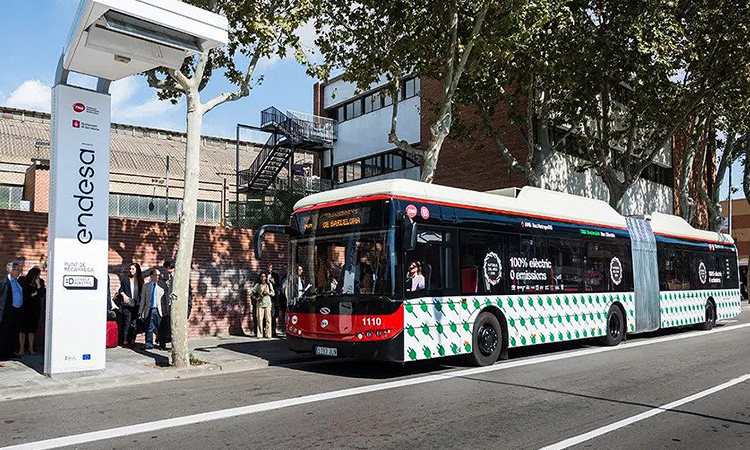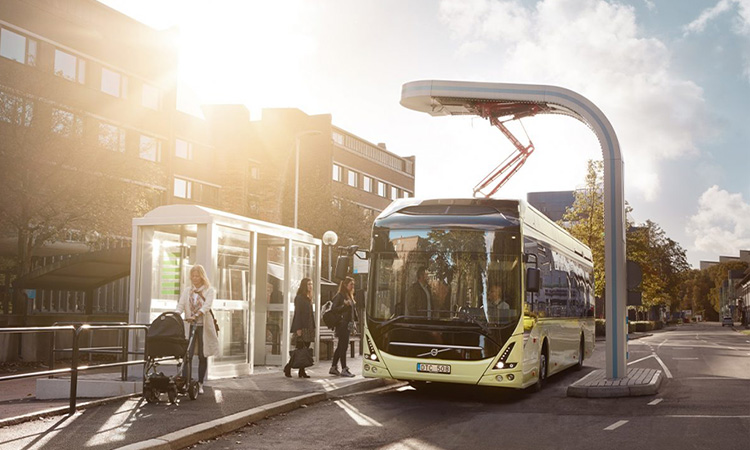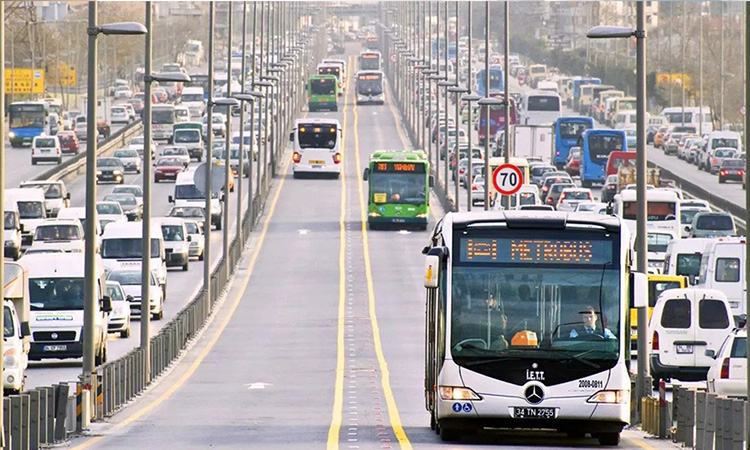Innovation is only real when shared: How the bus remains the staple of public transport through international collaboration
- Like
- Digg
- Del
- Tumblr
- VKontakte
- Buffer
- Love This
- Odnoklassniki
- Meneame
- Blogger
- Amazon
- Yahoo Mail
- Gmail
- AOL
- Newsvine
- HackerNews
- Evernote
- MySpace
- Mail.ru
- Viadeo
- Line
- Comments
- Yummly
- SMS
- Viber
- Telegram
- Subscribe
- Skype
- Facebook Messenger
- Kakao
- LiveJournal
- Yammer
- Edgar
- Fintel
- Mix
- Instapaper
- Copy Link
Posted: 31 May 2023 | Aida Abdulah -UITP, Flavio Grazian - UITP, Manel Rivera Bennassar - UITP | No comments yet
Considered perhaps the most prominent staple of public transport everywhere, it is precisely the bus that keeps on innovating – even resurrecting – its image. For Intelligent Transport, the Bus Unit of UITP discusses the joint global efforts from the entire sector to keep creating services that make people want to board the bus.


Credit: UITP
A European partnership on clean bus
Discussions on how we can change the future direction of our planet often quickly steer towards public transport, and they are likely to end with a plea for more clean buses. The sector has taken note – the last few years have seen an explosion in the development, technology maturity and deployment of clean bus fleets.
Key in these efforts are research and innovation projects, that enable development and testing of new technologies, as well as the collaboration needed to align this knowledge throughout the sector and world, bringing innovation onto our actual streets.
“UITP has a long history of co-ordinating and collaborating in projects such as ASSURED, JIVE/JIVE2 and the Clean Bus Europe Platform,” said Aida Abdulah, Head of Mobility Enablers Unit at UITP. She led the demonstration activities in ASSURED, which developed and tested innovative solutions to support the standardisation and interoperability of electric vehicle (EV) charging.
Aida Abdulah continued: “Rather as seeing these projects as separate initiatives, they are part of larger European and international collaboration efforts to create long-term certainty for the deployment of clean bus technologies.” A prime example here is the Clean Bus Europe Platform (CBEP), which had started in 2019 as a platform to facilitate an exchange of knowledge and experience between cities that are well progressed with clean bus deployment (Host Cities), and those who are yet to take the plunge (Target Cities).
We have given cities who are looking to make their fleets more sustainable the contacts and tools to make that happen”
“The Platform, an initiative under the European Commission’s Clean Bus Deployment Initiative, is a strong case of how international collaboration can actually achieve cleaner cities. Data collected for the ASSURED Clean Bus Report shows that the share of clean buses increased from 14.5% in 2017, to 22.9% in 2021 – a hike of 88%. This means that there is a wealth of knowledge and experience in deploying clean buses, and this needs to be shared.”
This has been done in the form of meetings, webinars and study tours that the Platform has organised. “What we see during these activities is exchange of very practical questions: Where do you get your funding? How do you adapt your depots in terms of energy supply and safety? When you see that target cities have started clean bus deployment because of what they have seen in other cities in the Platform, that is extremely encouraging,” said Abdulah. Here, the co-operation with other bodies and initiatives, like the UITP Bus and Trolleybus Committees, also foster the exchange of peer-to-peer knowledge.
On 7 June 2023 at the UITP Global Public Transport Summit in Barcelona, the CBEP will organise its Final Event, where it will invite cities to share their case studies on clean bus deployment. “This won’t mean the end of all these collaborative efforts,” Abdulah concludes. “We have given cities who are looking to make their fleets more sustainable the contacts and tools to make that happen. I’d like to think of the Platform as a strong launch of a European partnership that will continue for many years to come.”


Credit: UITP
The eBRT2030 project
Public transport investments are key to transform an entire city in terms of congestion and pollution and improve the daily life of citizens, and BRTs are an excellent tool”
Furthermore, Bus Rapid Transit (BRT) has significantly contributed to the continuous resurrection of the image of the bus. Nearly simultaneously appearing in Runcorn, UK, and Curitiba, Brazil, in the early 1970s, BRTs have had tremendous success in Latin America and have been replicated in many forms in regions across the world. More recently, BRT saw an increasing success in Asia, mainly in China, and is also on the rise in Africa. “Public transport investments are key to transform an entire city in terms of congestion and pollution and improve the daily life of citizens, and BRTs are an excellent tool when rightly planned and implemented,” said Flavio Grazian, Project Manager in the UITP Bus Unit.
Capitalising on BRT’s capabilities, the eBRT2030 project, funded under the European Union’s (EU) Horizon Europe programme, kicked off its activities in January 2023. Under the helm of UITP, the project will bring together 45 partners to support sustainable urban transport by proposing innovative solutions for electric BRT. In the next four years, eBRT2030 will demonstrate the applicability of a new generation of electric BRT systems, more tailored for European cities and advanced with new automation and connectivity functionalities.
Grazian continued: “In the project we will not only look at electrification of BRT buses, but also at the features that enhance bus services through infrastructure, and more importantly innovations in operations, connectivity, fleet optimisation and predictive maintenance. These innovations aim to create a next generation of future-proof electric BRT.”
eBRT2030 will have seven demonstrations to test its solutions in real life: six in Europe (in Barcelona, Amsterdam, Athens, Prague, Eindhoven and Rimini) and one in Bogota.
“An important focus will be on the international aspect. We want to enable replicability in the global south by demonstrating the advanced electrified BRT concept, taking into account the local conditions and barriers such as legislations, incompatibility of technical features and affordability. In developing countries, BRTs are a tool to transform the public transport provision in cities by transitioning from informal transport to a planned network with a hierarchy of trunk and feeder lines, which in turn facilitate the deployment of zero-emission buses.” Grazian concludes: “In the end, the aim is the development of an international market for European electric BRT systems – to see how our solutions can help tackle global problems.”


Credit: UITP
International collaboration in TUMI
Developed from the Action towards Climate-friendly Transport Initiative launched at the 2019 United Nations (UN) Climate Action Summit, the TUMI E-Bus Mission also targets the global south by supporting 20 ‘deep dive cities’ in their transition to electric bus deployment. The mission is funded under the German Ministry for Economic Cooperation and Development (BMZ) and joins core groups, including the Deutsche Gesellschaft für Internationale Zusammenarbeit (GIZ).
In addition, in TUMI, collaboration and exchange are pivotal to achieve real progress in the transition to clean and electric bus fleets. Alongside the deep dive cities, TUMI has been expanding its sustainability quest to a larger learning network of cities across India, Indonesia, Latin America and Africa. Through the TUMI E-Bus City Network, co-led by UITP and ICLEI, member cities can benefit from shared resources, enabling capacity building for the planning and implementation of electric buses.
TUMI’s goal is not only to increase the number of electric buses in the cities, but rather to incentivise maturation of electric bus technology advancing mass roll-out worldwide”
“TUMI’s goal is not only to increase the number of electric buses in the cities, but rather to incentivise maturation of electric bus technology advancing mass roll-out worldwide,” said Manel Rivera Bennassar, Bus Manager at UITP.
In 2022, UITP led a mission to Nairobi in the framework of TUMI, aiming to assist transport authorities in developing a roadmap for electric bus implementation. “Each city has different needs, so an individual approach is required,” Rivera Bennassar continued. “In Nairobi, UITP conducted a peer review study on their e-mobility strategy, supporting the creation of a long-term electric bus deployment strategy for the BRT project in progress, and for all transport modes including the matatu fleet.”
Moreover, in Latin America (E-Bus Financial Market Dialogues), India (Network City Dialogues) and in Tanzania (training on electric bus procurement) UITP is organising activities aimed towards accelerating clean mobility in the global south.
“To make a smarter, safer and more sustainable sector, there needs to be investment in research and innovation first, the need for international collaboration and peer-to-peer knowledge exchange comes directly with it. Together with our members, UITP continuously works to transcend a specific project, or technology, or even interests, and connect the dots in the sector, needed to achieve real change,” concluded Rivera Bennassar.
The Clean Bus Europe Platform and eBRT2030 will be among the many projects sharing their insights at the UITP Summit in Barcelona. To join the discussion, click here.
Related topics
Accessibility, Air Quality, Alternative Power, Mobility Services, Public Transport, Sustainable Urban Transport
Related modes
Bus & Coach
Related organisations
European Union (EU), International Association for Public Transport (UITP), UITP, United Nations (UN)
Related people
Aida Abdulah, Flavio Grazian, Manel Rivera Bennassar








